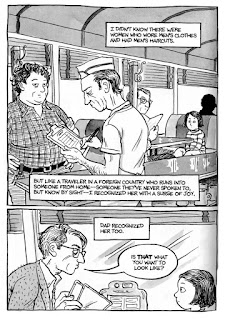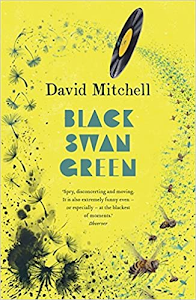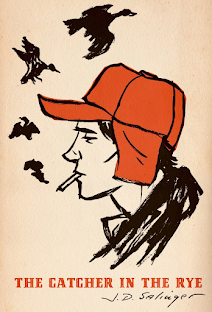Coming Out and Coming-of-Age
For many queer individuals, coming out is the greatest accomplishment in self-actualization. It gives you a picture of who you were before; insecure in your identity, possibly ashamed, hiding a part of yourself, and generally unsure of who you truly are, and picture of who you are after; living your truth, hopefully being accepted. This narrative of before vs. after, insecure vs. proud, confused vs. knowledgable, relates a lot to the coming-of-age narrative. Both have a rocky beginning, a period of trials and self-discovery, and a final stage of growth and self-acceptance. This is why Alison Bechdel's Fun Home is so compelling; it presents a coming out and coming-of-age narrative in tandem, each making the other more powerful because of the complexities it adds.
I would, however, like to point out that, unlike Alison's story, coming out and coming-of-age do not always occur simultaneously. Everyone's journey to self-discovery is different, and everyone has different timelines. Alison herself does not go through both of these changes at the exact same time, but they are interwoven in a way that make them influence one another. A person's coming out can affect the way they come of age, or vice versa.
For Alison, her coming-of-age has a lot to do with her self-expression. She is the "butch to [her] father's nelly," wearing mismatched patterns, looking at snakes in the back yard and taking little interest in her father's perfect world. She grows up resenting his control, preferring to be as untamed as she possibly can. When she sees the trucker woman at the diner, she knows that is how she wants to present — the self-realization piece of her coming-of-age. However, her father taints this discovery by reprimanding Alison, forcing her into the role he sees for her and complicating both of her journeys.


I did say something reckless in class like "every coming-out narrative is a version of a coming-of-age narrative," partly because I like aphorisms and wish I felt confident enough to speak in this form more often, partly because it "seems" true. But you're right that all such generalizations can be challenged, and we should be more careful anytime we use words like "every." I'm sure a range of examples could be cited in which a person has fully come of age into one identity and then shifts to another--though they might be said to then "come of age" a second time.
ReplyDeleteI still do think that, even on different "timelines," people who come to embrace their identity later in life often do portray that journey of self-discovery in terms that recall the coming-of-age dynamics, and Alison's narrative blends both threads together to form a clear hero's journey narrative. (I've also said that MANY--not every--coming-of-age narratives echo the hero's journey structure. Though I wouldn't categorize _Sag Harbor_ that way.) There are so many overlaps with the idea of claiming/embracing identity, making certain discoveries about oneself that redefine the course of one's life and one's relationships with others. In Bruce's case specifically, I see Bechdel depicting him as a potential Daedalus who "fails to launch" in various ways, or who fails to go on his own "journey," preferring to stay put in Beech Creek (with I-80 just nearby leading east to Greenwich Village and West to the Castro). In this book, there is an indisputable link between coming-out and coming-of-age, and Bruce can be viewed as a character who, in Alison's view, tragically never fully comes of age. That final conversation in the car, where she feels like the "parent" and he's the awkward and ashamed kid, drives that role-reversal home.
Great post! I definitely can see how coming out plays a huge role in coming of age because you are finally being able to express your full truth. I think that Bruce's inability to come out definitely affected Allison's desire to express her sexuality and be proud of it once she discovered she was lesbian. A huge theme in Fun Home is Allison seeing her parents living unhappy lives and deciding she wanted to be the complete opposite of them. I find it kind of ironic how Bruce hiding himself indirectly led to Allison's pride in her identity.
ReplyDelete